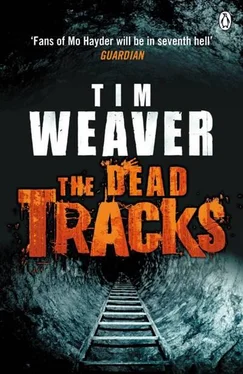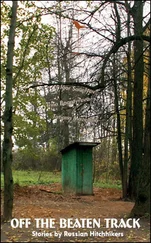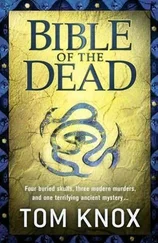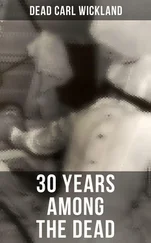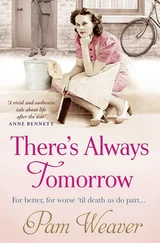'You ever had any copycats?'
He paused. You got someone running around pretending to be Sykes?'
'No. I'm just asking'. 'No.'
'No copycats?'
'No. He's old school now. Most people under forty probably wouldn't even be able to tell you who he was. Sykes is the grandparents' story. Once that generation dies out, no one will even know what he did.'
'So tell me about him.'
'What do you want to know?'
'Everything.'
The line drifted a little. It sounded like he was moving. When he started talking again, it was virtually a whisper: 'Okay, you want my theory?'
'That's why I phoned.'
Another pause. 'He buried them in the woods.'
I heard the line drift again. He was moving to a place where absolutely no one would hear him talking. I reached across to the hands-free and turned the volume all the way up. 'Just give me the condensed version,' I said.
'The condensed version's the same as the long version: he was screwed from day one. His father pisses off the moment he zips himself up, and his mother pops her clogs from tuberculosis two months after young Milton is born. Sykes goes to live with his psychopathic aunty and uncle down the road; she's the bitch from hell, and he's a violent pisshead. Cue sixteen years of being beaten shitless and locked in the dark. School was a total write-off as you might have expected, although he got an A for killing animals and being a weird loner no one liked or spoke to.'
'What happened after he left home?'
'He landed a job at a dyeworks near East India Docks. Then women started disappearing. You think we're bad at our jobs; police back then didn't even notice for six years.'
'How come?'
'All the women were Indian immigrants working in the textiles factories. Their families reported them missing, but their English was bad or non-existent. Police excused themselves after Sykes was arrested by pretending they couldn't understand what they were being told - but, truth was, they probably didn't give much of a shit.'
'So how'd he get caught?'
'He stopped taking Indian girls.'
'And took a white one instead.'
'Right. Girl called Jenny Truman. Nineteen. Blonde- haired, blue-eyed. Goes to work at one of the factories in the morning and never comes home again.'
'Why change?'
'He was clever. He knew the police wouldn't go hard at the Indian disappearances, so he played things safe. But after a while he couldn't help himself and went after Truman. That was when the police finally decided to get serious. Eventually a couple of witnesses told them they'd seen her leaving with someone matching Sykes's description. So they head down to Sykes's place at Forham Avenue. You know where that is?'
'No.'
'That's because they've knocked it down now and built an industrial estate where the road used to be. It was right on the edge of Hark's Hill Woods, this big, overgrown area full of old factories in east London. When the police fumed up at Sykes's house, he excused himself and headed to a toilet at the bottom of his garden - and then made a break for it. Vanished into the woods.'
'Did they find him?'
'No. They lost him. But they searched his house and found a dress belonging to Jenny Truman with blood all over it, and a shovel - all hidden in a wall cavity in his kitchen. Three days later, he hands himself in to a police station in Camberwell.'
'Why?'
'Said he was tired of running'
'So they never found the bodies?'
'Nah,' Dooley said. 'After he got the rope in 1906, they did another search of the woods and came up empty- handed like before. But he must have buried them in there.'
'Why d'you say that?'
'He knew those woods like I know the way to the bar. He used to escape there as a kid to get away from his nut- job family. There was this place he talked about in his interviews with police. Locals used to call it the Hanging Tree; this weird, T-shaped oak, all gnarly and messed up, that looked like a giant set of gallows. There are photos of it online. Most people were completely freaked out by it, but not young Milton. He loved it so much he built a tree house in it. You ever been there?'
'Hark's Hill? No.'
'It's a strange place. Got this…' Dooley paused, then dropped his voice even further. 'Got this kind of… atmosphere.'
I smiled. You a psychic now?'
'Laugh it up. You don't believe me, ask the teams they sent down there in the 1920s to try and put a train track through there.'
'What do you mean?'
'Back in 1921, the local authority decided they wanted some track running from the factories up on Hark's Hill to the mainline on the other side of the woods. They sent teams in there to clear a path and start laying the foundations for the train tracks, only…' He paused again. 'Only, they got spooked.'
'Spooked?'
'They kept seeing things and hearing things.'
'What sort of things?'
'No one was ever sure, but enough to put the shits up them. That little project lasted four weeks before the entire workforce decided enough was enough.'
'They walked?'
'Like I said, that place…' Dooley sucked in his breath. 'First time someone told me that story I laughed my arse off. But you want to try going down there some time.'
'Are you serious?'
'Go down there,' he said, no hint of humour in his voice. You know me: the only thing I believe in is a beer on a Friday night. But you go to enough crime scenes, you start to get a real sense of life and death. And sometimes…'
'What?'
'I've worked murders for fifteen years, and some of the places you end up… I don't know, you're standing over bodies in these holes, and you can just feel a place is bad.
That's the only way I can describe it. You get a sense for places; kind of attuned to things. That's why I'm telling you he buried those women in the woods. Because I went down there, and that place… something's seriously wrong with it.'
Chapter Twenty-two
When I got back to the house, I checked for answer phone messages and then switched on the TV. A reporter was standing near the Royal Docks, the Thames framed behind her. At the bottom of the screen, a ticker tape was running right to left: MET POLICE: WOMAN FOUND IN THAMES RETURNED TO FAMILY. FAMILY HAVE REQUESTED NO NAMES/DETAILS BE RELEASED TO PUBLIC. I remembered the same reporter covering the same story a couple of days before while I was in the cafe close to Newcross Secondary. I didn't know much about it, but I did know that, if it had any legs, it wouldn't have been tucked away right at the end of the hourly bulletin.
After showering, I went through my wardrobe. Laid a shirt out. Trousers. A pair of shoes I hadn't worn since the funeral. Then I sat on the edge of the bed and looked at my reflection in the mirror. That same flicker ignited in my stomach, and I felt all the doubt and the guilt and the fear move through my chest.
It's too soon , I thought .
And then I realized, until I did it, it would always be too soon.
Ten minutes later, Liz answered her door. She looked beautiful. She was wearing a black halterneck dress that followed the shape of her body all the way down to the middle of her calves. Her hair was curled at the ends, falling against her shoulders in ringlets. She had a little make-up on, but not much, and her eyes were dark and playful, looking me up and down.
'Wow,' I said.
'Thank you.' She fluttered her eyelids jokingly and reached for a long black coat laid over the back of one of the sofas. 'You look very dashing too.'
I looked down at myself. I had a black button-up shirt on, a smart pair of denims and a long, black, very expensive Armani jacket I'd bought at a shiny supermall in Dubai when I'd had to spend a week out there with the paper. It had looked great on the hanger, even better on, but decidedly less good coming out of my bank account. Since then, I'd worn it three times, terrified I'd irreparably damage it by subjecting it to fresh air.
Читать дальше
